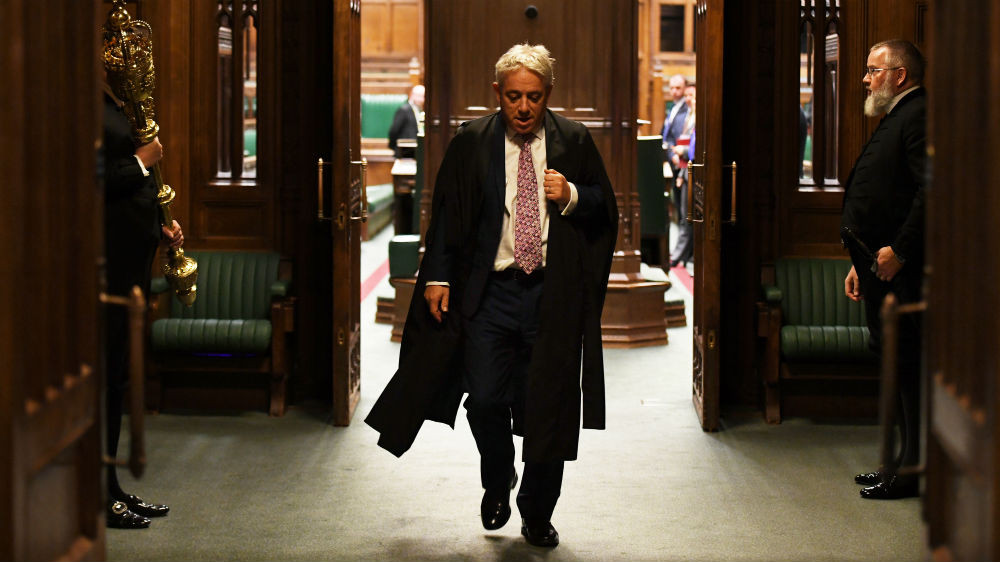 John Bercow departs the House of Commons chamber for the final time as speaker
John Bercow departs the House of Commons chamber for the final time as speaker
John Bercow. The name itself evokes the booming cry of “Order! Order!” that echoed through the halls of the UK’s House of Commons for a decade. While his booming voice and commanding presence turned him into something of a social media sensation, the true legacy of John Bercow, as Speaker of the House, is far more complex and significant. As he stepped down from his role in October 2019, historians began to assess the profound and often controversial impact Bercow had on British democracy, particularly during the turbulent Brexit years.
For many, John Bercow became synonymous with the sound of British Parliament, his calls for “Order!” becoming iconic clips across social media. However, beyond the memes and viral moments, Bercow’s decade-long tenure as speaker was marked by significant shifts in parliamentary procedure and a central role in the Brexit saga. While some lauded him as a champion of parliamentary sovereignty, others, particularly within the Conservative party, viewed him as biased and obstructive. Even as Members of Parliament (MPs) offered tributes to Bercow upon his departure, then Prime Minister Boris Johnson couldn’t resist a parting shot, suggesting Bercow had been more of a player than an impartial umpire.
Bercow’s Impact on Parliamentary Procedure
Analysts like Marc Geddes from the University of Edinburgh highlight John Bercow’s commitment to empowering backbench MPs. Bercow’s speakership saw a notable increase in the voices of ordinary members, shifting the balance of power away from the executive branch. This “procedural fluidity,” as Geddes describes it, included allowing amendments to motions that were previously considered untouchable. This change fundamentally altered how Parliament operated, creating avenues for more dynamic and often disruptive debates.
One of the most significant procedural changes under John Bercow was the dramatic rise in “urgent questions” and debates initiated by MPs. This resulted in Parliament becoming a more active and assertive body, holding the government to greater account. It was this procedural shift that paved the way for crucial legislation like the Benn Act, which compelled Johnson to seek an extension to the Brexit deadline – a move vehemently opposed by the Prime Minister. Geddes notes that Bercow’s procedural reforms directly impacted the course of Brexit and left a lasting mark on parliamentary practices.
Champion of Parliament vs. Accusations of Bias
Mark Shanahan, Head of Politics and International Relations at the University of Reading, offers a nuanced perspective on John Bercow’s impartiality. While Bercow openly admitted to voting against Brexit in the 2016 referendum, Shanahan argues that Bercow’s “partiality was towards protecting parliament, not to any particular party.” This view suggests Bercow’s actions, though often perceived as anti-government, were rooted in a deeper commitment to upholding the sovereignty and relevance of Parliament in the face of a powerful executive.
Tim Bale, Professor of Politics at Queen Mary University London, echoes this sentiment, suggesting John Bercow recognized a shift in the political landscape. In what Bale terms a “post-truth world,” Bercow understood that a traditional, passive speakership would leave Parliament vulnerable to governmental maneuvering. Bercow’s active interpretation of parliamentary procedures, therefore, can be seen as a response to a changing political environment where governments were perceived as less inclined to adhere to conventional norms. Bercow himself famously stated, “If I’m biased, I’m biased in favour of parliament,” encapsulating his self-professed guiding principle. This stance often put him at odds with his own Conservative party, particularly as both Boris Johnson and his predecessor, Theresa May, sought to navigate the complexities of Brexit with minimal parliamentary interference.
Controversies and Criticisms: Bullying Allegations
Despite his championing of parliamentary sovereignty, John Bercow’s tenure was also shadowed by controversies. Allegations of bullying staff within the House of Commons surfaced, casting a negative light on his leadership. A 2018 inquiry pointed to a culture of harassment within Parliament, seemingly implicating Bercow’s leadership style. Geddes points to these bullying accusations as a “very negative legacy” that often gets overlooked in discussions of Bercow’s speakership.
Shanahan further adds that Bercow, despite his efforts at reform, failed to fully address the entrenched “public school boys club” culture within Westminster. These criticisms suggest that while Bercow may have modernized some parliamentary procedures, deeper cultural issues persisted during his time as speaker.
Positive Reforms: Modernizing Parliament
Amidst the controversies, John Bercow also oversaw positive changes aimed at modernizing Parliament and making it more inclusive. Notably, he championed the creation of a creche within Parliament, a significant step towards making the institution more family-friendly and gender-equal. He also reformed the operations of parliamentary clerks, streamlining processes and removing what he considered unnecessary formality.
These reforms, while perhaps less dramatic than his procedural interventions during Brexit, demonstrate a commitment to modernizing the institution and making it more accessible and equitable.
Bercow’s Character and Local MP Role
Beyond the political theater of Westminster, those who know John Bercow personally describe him as a quick-witted and intelligent individual. Shanahan, also a constituent in Bercow’s Buckingham constituency, attests to his effectiveness as a local MP. Shanahan notes Bercow’s accessibility, courtesy, and willingness to engage with his constituents, including students, suggesting a more personable side to the often-combative Speaker.
In conclusion, John Bercow’s legacy is a complex tapestry woven with threads of parliamentary reform, Brexit controversy, and personal allegations. While his booming “Order!” became a global soundbite, his true impact lies in the procedural changes he enacted, his championing of backbench MPs, and his central role in the tumultuous Brexit debates. Whether viewed as a hero of parliamentary sovereignty or a biased disruptor, John Bercow undoubtedly left an indelible mark on British politics and the House of Commons.

